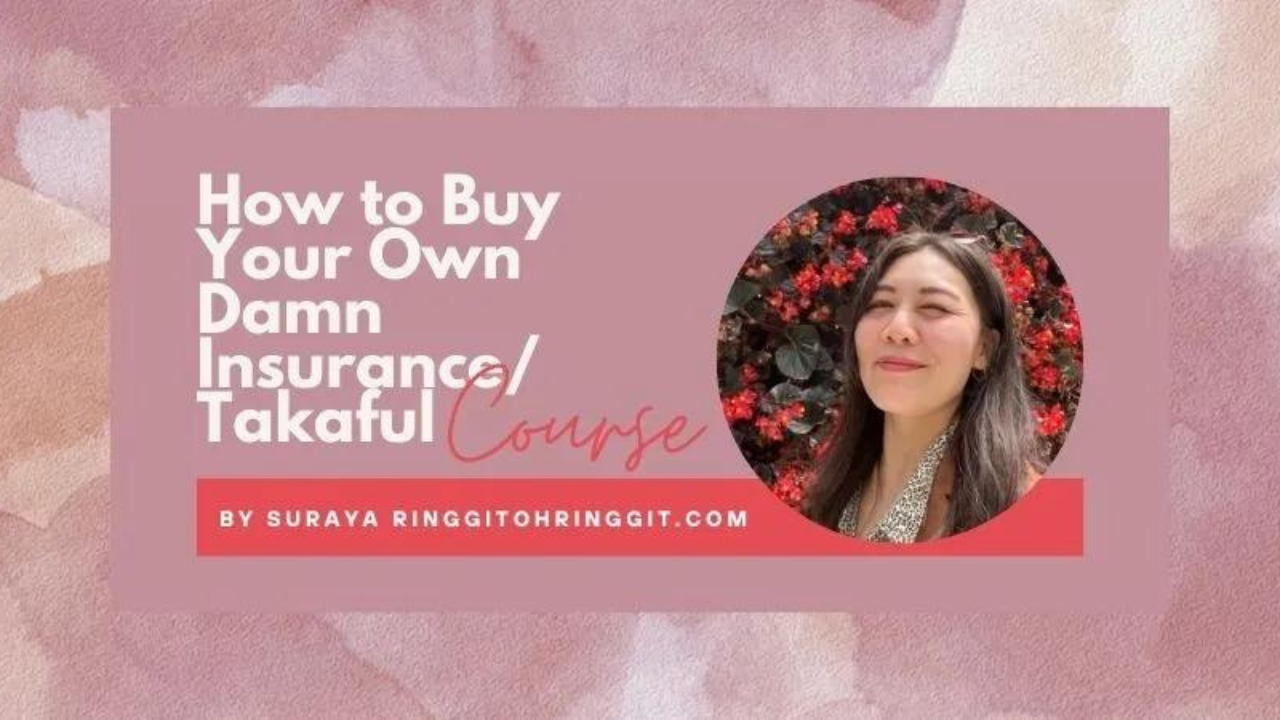How to Buy Your Own Damn Insurance is a 2-hour webinar created by Suraya, Malaysia’s popular personal finance blogger behind RinggitOhRinggit.com, on what is needed to know about buying insurance/takaful as a consumer.
What is it?
How to Buy Your Own Damn Insurance is a 2-hour webinar on what is needed to know about buying insurance/takaful as a consumer. Insurance is a product with many jargons that can overwhelm a typical consumer, so this course breaks down the Life, Critical Illness, Medical and Personal Accident in general.
Who is the instructor?
Suraya has a personal finance website called ringgitohringgit.com since 2015 and has completed all CFP modules (but not working as a financial planner). She is also an author of the bestseller book Bergaji & Pokai.
My Top 3 Learnings
1. Conventional vs Takaful
As a consumer, I would feel very overwhelmed by the number of protection products available in the market and have no idea where to start. Suraya spoke about the main difference in life insurance products in the Malaysian market, which is either conventional or Takaful products.
Below is a simple table to highlight the difference:
| Conventional | Takaful |
| Abundant with riba, gharar and maisir – Likely criticizing conventional products for containing elements that are considered unethical or unlawful in Islamic finance | Free from riba, gharar and maisir – Takaful products are considered ethically and legally compliant in Islamic finance |
| Based solely on commercial factors – Decision-making process or the actions taken are influenced only by economic considerations or business interests | Based on mutual co-operation and tabarru – Arrangement or transaction is built on principles of collaboration, mutual benefit, and voluntary contribution without expecting direct compensation in return |
| Non-Shariah Advisory – Not tailored to conform to Islamic law | Shariah Advisory Council (SAC) – Refers to a group of Islamic scholars or experts who provide guidance and oversight to ensure that Takaful (Islamic insurance) products comply with Shariah principles |
| Company Management – Refers to the processes, practices, and individuals responsible for overseeing and operating an insurance company that operates within the framework of conventional financial systems and regulatory frameworks, as opposed to Islamic finance principles | Operator – Plays a pivotal role in the functioning of a Takaful company, overseeing various aspects of the business to ensure its smooth operation and compliance with Shariah principles. |
| Interest Practice – Refers to the accrual of interest on policyholder funds held by the insurance company | Shariah-Compliant, riba free – Refers to the payment and receipt of interest are prohibited under Shariah law |
| Profit of Insurance Company | Distribution is participants on pro-rated basis |
* Riba = Interest
* Gharar = Uncertainty
* Maisir = Gambling
* Tabarru – Voluntary contribution or donation made by individuals to a common pool with the intention of helping others in need or supporting mutual assistance
2. Investment-Linked Product
Investment-linked products operate on a straightforward principle: the premium paid by the policyholder is deducted by agent commissions, leaving the remainder to be invested in a unit trust fund.
Premium – Agent Commission = Unit Trust Fund
While this structure offers the potential for growth through investment, it’s essential to acknowledge the impact of high commissions on premiums. The truth is, high commissions can significantly inflate premiums, potentially reducing the amount available for investment.
As a result, policyholders may find that the value of their unit trust is lower than anticipated, as a significant portion of their premium has been allocated to agent commissions rather than investment.
Therefore, when considering investment-linked products, it’s crucial to carefully assess the commission structure and its potential impact on the growth of the unit trust fund.
3. Insurance Should Take Up 5-10% of Your Income, Max
When considering insurance, financial experts often recommend allocating a manageable portion of one’s income, ideally between 5% to 10%, towards premiums.
For instance, if an individual earns RM3000 monthly, this would equate to a premium range of RM150 to RM300 per month. Adhering to this guideline becomes particularly crucial if income is variable or savings are limited. In such cases, it’s advisable to opt for lower premiums to ensure affordability.
However, the reality is that many individuals may struggle to afford comprehensive insurance coverage. In such situations, it’s acceptable to prioritize coverage based on individual financial circumstances. Those with substantial liquid assets may find it acceptable to have less coverage, relying instead on their assets to mitigate potential risks.
Ultimately, the key is to strike a balance between financial protection and affordability, ensuring that insurance remains a manageable expense within one’s overall financial plan.
Conclusion
The course is perfect for those who want to learn to make better decisions when it comes to protecting themselves financially based on their situation. Suraya has done a great job at breaking down the different life insurance products and their respective pros and cons. Suraya is also open to sharing her personal experience and tips when it comes to buying her own insurance as a neutral third party. It’s a course worth a lifetime, priced at RM59.




